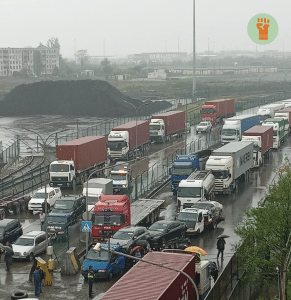
Credit: Poti Citizens for their rights
When the wind blows from the sea, hundreds of people living near the commercial port of Poti don’t even dare to open their windows or go outside. They fear that the black, toxic dust coming from the cargos could enter their lungs and creep into their homes.
Located on the eastern Black Sea coast in Georgia, the port of Poti is the largest in the country and it handles 85% of the national container traffic. Millions of tons of bulk cargo – including copper concentrate, clinker, sulfur, and coal – are processed out in the open, despite the risk that these substances can pose to the environment and to public health. Near the port, trucks move back and forth all day long, contributing to the noise and air pollution.
“When I was a child, Poti was famous for its eucalyptus groves and its coastline”, says Eliso Janashia, a local human rights and environmental activist. “But today there are no more eucalyptus groves, no more windbreaks, and access to the sea is blocked by bulk and container cargo terminals. The local community is surrounded by an increasing number of polluting industries and terminals, and the air is so polluted that life has become unbearable for them.”
The situation is particularly dramatic for the people living in Javakhishvili Street, located right in front of the Transford LLC terminal. In the 1990s, when war erupted in the separatist region of Abkhazia, a group of internally displaced families took refuge in two five-storey buildings in this street. This refuge, though, turned out to be a trap: outside their buildings, the air is unbreathable.
For years local residents have been raising concerns about pollution in the area and the serious impacts on their health, particularly for children and the elderly. In 2020, they created the local association “Poti Citizens for their rights” to demand an independent assessment of the air quality and relocation to a safer, cleaner area.
As a result of their activism, in July 2020 the National Environmental Agency (NEA) installed a mobile air quality monitoring station in Javakhishvili street. The first results were very worrying: the level of dust particles (PM 10 and PM 2.5) were exceptionally high. But after 5 months, NEA decided to shut the air station down and left it turned off for 22 months, claiming they were unable to provide the necessary maintenance. According to local residents, the results were so damning that they decided to close it, fearing people’s reaction.
With the support of a local non-governmental organization, the residents also tested the hair and blood of twenty local children, finding that excess lead was present in half of the samples. In 2021, thanks to their campaigning, the municipality agreed to conduct a larger study with 104 children and found excess amounts of lead in 37 of them. However, according to an article published by the Heinrich-Böll-Stiftung foundation, the sample was not representative: half of the children did not come from Javakhishvili street, but from a relatively cleaner area.
Local residents have organized several protests and advocacy actions. Yet, both the municipality and the financiers that are supporting the port’s operation have been ignoring their concerns and their demands. In 2019 and 2020, the companies operating the terminal received a 50 million USD loan from the US International Development Finance Corporation (DFC) to expand the operations in the port. Technically, DFC projects should follow the same social and environmental safeguards of the International Finance Corporations. In this case, however, the safeguards were completely bypassed.
But the families of Javakhishvili street are not giving up and they keep fighting for the future of their children, and for their right to a safe, clean and healthy environment.

